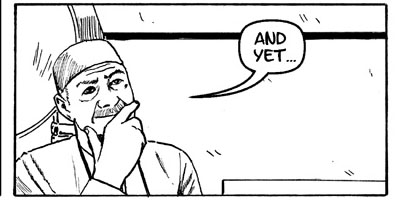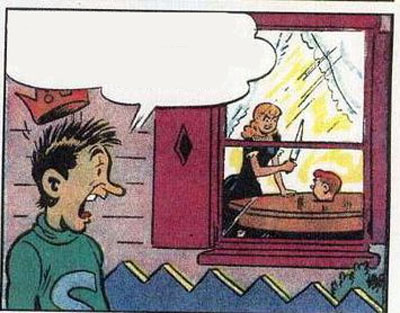
Click on thumb to see full
As always, you can also go to the dedicated Al’Rashad site.
25
Feb

As always, you can also go to the dedicated Al’Rashad site.
24
Feb
Since the thing that was previously worst in the world was a commercial, it is only fair that one such also be the best:
“Yeah… cool guy.”
But then Foot Locker released the even better alternate version:
DOPE.
23
Feb
As I’m given to understand it, Sony announced the other day that the astonishing perfection of the CD-based Playstation, which had been superseded by the even more astonishing perfection of the DVD-based Playstation 2, which had then been rendered obsolete by the Blu-Ray vision that was the Playstation 3, had in turn become an outmoded and worthless piece of crap compared to the forthcoming Playstation 4. The reaction I’ve heard (which is, admittedly, reading a bit of Penny Arcade and Kotaku, because I didn’t even bother with the PS3 let alone caring deeply about a hypothetical game console that they wouldn’t even show people at the press conference) is a resounding “meh”. Why might that be? Apart, of course, from the fact that they wouldn’t even show people the console at the unveiling press conference.
I’m starting to form a radical theory about why the latest generation of game consoles (Wii U, PS4, and whatever Microsoft is going to unveil in a wek or two) have gotten such lukewarm receptions. It’s probably going to be controversial…heck, I’d say there’s no more than a 50/50 chance that it’s right…but I think that there’s not actually as much incentive as the game companies think there is to improve the performance of their consoles. In short, I’m starting to believe that the age of video game hardware improvements is coming, slowly but surely, to a close.
This isn’t to say that they can’t do any better. I’m sure that processing power is improving on a very impressive curve, if only because the experience of my entire life has been one of computers getting constantly better (when I was born, the brand-new state of the art personal computers had 16K of RAM.) While there does at some point have to be a plateau for the improvement of the computer, we’ve not found it yet and we don’t even really know where it might be. So this isn’t a “man will never reach the moon” type rant about how they’ve reached the limits of how good a gaming console can get.
It is, however, true that there is a point of diminishing returns in terms of how well these improvements in processing power will translate into practical, measurable gains in the finished product. The previous jumps in technology have been immediately obvious to the average consumer; someone playing an Atari 2600 would see the NES as a clear improvement over their machine, just as the Super Nintendo was obviously better than the NES, the Playstation was immediately better than the Super Nintendo, and the PS2 was eye-poppingly better than the PS1. But with the PS3, there wasn’t the same level of “eye candy”. It was better–of course it was better–but it wasn’t a quantum leap the way the PS2 had been over its predecessor. That was the opening that let the not-quite-as-powerful but much cheaper Wii in to lead the market; it wasn’t as good as the PS3 or the XBox 360, but it was good enough and it was about $350 cheaper.
And while the PS4 is bound to be an improvement over the PS3, developers already have enough processing power to make astonishing games that are beyond our expectations. Slight improvements in skin texturing and particle physics isn’t going to make the next Batman game better than ‘Arkham Asylum’; clever game design and innovations in playability will. Being able to represent more figures onscreen at any given time, doing different things isn’t what makes a game great; if it was, ‘State of Emergency’ wouldn’t have been as dull as dishwater. We have reached a point where it’s not how much power your machine packs, it’s what you do with it.
The question is, what does this mean for the industry? Because it’s clear that Sony/Nintendo/Microsoft have a marketing strategy that involves avoiding market saturation for their product by putting out a “new, improved” version every six or seven years and coercing the software companies into supporting only the latest toys. But if the buying public doesn’t make the jump, what does that do to the company that just spent hundreds of millions of dollars on R&D? Can software companies afford to gamble that there’s no need to design games for the next-gen platforms? Or is the system simply “too big to fail”? Will the buying public just continue to buy next-gen consoles simply because the assumption that they must be better has become too ingrained? Something tells me there has to be a reckoning at some point for the continuing push for an ever-better system at all costs, but I can’t predict when it would be.
If you think you can, feel free to share it here! I’ll buy stock based on your recommendations, but hey, no pressure.
20
Feb
Somewhere in between Hawkman framing a petty criminal for being a space alien murderer and J’onn J’onzz threatening to lobotomize an entire building, you come to realize that all DC superhero comics are now shit and not worth your time for the foreseeable future.
20
Feb
This ad:
You have to understand that it is not simply that this is a bad commercial (and it’s a very bad commercial). It is that this commercial is on all the goddamn time. Watch the Raptors game? Okay, get ready to see this commercial fourteen times. Watch The Daily Show? Five times in a half hour! It NEVER FUCKING ENDS. Is there a worse commercial airing currently than this one? Seriously, if there is, put up a Youtube link in comments because I think the sheer banality of this one cannot be topped.
19
Feb
Have been reading a lot of reviews of Dead Space 3 lately, and although I am not terribly concerned about it – mostly because it is not on Steam, and these days if it’s not on Steam I’m not gonna bother buying a game, frankly – but there are a whole lot of people who are apparently really pissed that the franchise is no longer really a horror story but is morphing into an action series. It’s understandable to be peeved, because if you like something when it is one thing, you might want more of that one thing than of another thing. But in the case of Dead Space‘s narrative progression, there is no choice: so long as you want the story to continue, then the horror aspect of it has to eventually end.
Consider: the first installment of most horror franchises is all about fear of the unknown (which, whether said unknowingness is derived from shock or suspense, is the most effective type of fear in a dramatic sense). In Alien, for example, the fear is generated by the characters genuinely having no idea of what they have found re: the crashed spaceship and the aliens therein, and then having no idea of the capabilities of the alien itself. In Dead Space, the characters are ignorant of everything at the start of the game and have to gradually learn what the monsters are, why they kill people and consume corpses, what happened on the ship, et cetera, and what is “known” to the player is only known because of genre osmosis (spaceships have artificial gravity, asteroids can fuck up your spaceship, and so on). In fact Dead Space neatly inverts several tropes to play against the player’s “knowledge” early on – for example, shooting the space zombie monsters in the head actually does nothing (you have to shoot off their limbs instead), which makes a player’s first encounter with the uglies more tense when the space zombies aren’t behaving as space zombies ought to behave according to the rules they already know. But those rules are arbitrary, and Dead Space gets that, which is why it works as a horror narrative. Often the scariest moments in the game are those times when one of your allies’ radios clicks on and shocks the hell out of you because you are primed to think “monster jumping out” whenever you hear something you weren’t expecting.
But when we progress to the second installment of a horror franchise? If your protagonist from the first installment has survived (and due to the inherent nature of sequelitis, they probably have done) you can’t rely on lack of knowledge to provide horror, not entirely, because now both your audience and your protagonist know stuff about the monsters. The answer to continue to create horror, then, is generally a combination of two things: firstly, add some more stuff the protagonist/audience didn’t get a chance to learn the first time out and use that to create fear of the remaining unknown, and secondly take what is already known and recontextualize it in a manner that presents new challenges and threats – fear of the known. In Aliens, we find out that the Aliens are basically an insect race and that they aren’t simply mindless killing machines because they can organize ambushes and evade traps (fear of the unknown) and we also get to find out what happens when there is a lot more than one Alien to deal with, even if you have lots of guns (fear of the known). In Dead Space 2 we find out what the space zombies can escalate into (it is bad) and that there are more varieties, including some which are just not conventionally kill-able like all the rest (fear of the unknown) and we also get to fight the space zombies in new locales, and also there is that bit where you have to stick the needle into your own eye (fear of the known). And this blend usually-but-not-always works.
However, by the time you get to the third installment of your horror franchise, you are pretty much out of “unknown” unless you just start making shit up that might technically work within the narrative from a logistical standpoint but which isn’t exactly aligned with everything you’ve done so far. (Some people accuse Lost of having done this, and although it is not a horror show per se, they had kind of a point.) Given that the fans of your story will generally resent the out-of-left-field “unknown,” all that leaves you with is fear of the known – and at this point your protagonist has suffered so much in the first two installments that they’re not going to be credibly scared of any of it any more. (Not a horror example, but consider how John McClane changes in the Die Hard movies – in the first couple, he frequently desperately prays that some plan of his will work and that he won’t die, and then as the third and fourth progress he is increasingly blase about the insane things he is doing, because his fear has died.) Fear of the known can usually be planned for and dealt with, and when one has to improvise, one knows what will and won’t work within reasonable limits. (The obvious exception here is Cthulhu-style horror where knowledge of the enemy is either actively dangerous to have or completely meaningless because the enemy is too powerful for it to matter, but as a general rule, protagonists in that milieu don’t last past one story for reasons which are fairly obvious.)
In other words, the difference between a horror movie and an action movie is, mostly, the protagonist’s degree of knowledge. Which means as any horror narrative continues and develops, it by necessity has to gradually drift towards being an action movie (or something else, but action is the easiest progression because the two genres are so similar and both strive to hit the same adrenalin-producing nerve in the viewer), simply because the protagonist will learn more and more – you can see this even in many regular horror movies within the three-act structure where the hero, in the third act, finally confronts the baddie. That progression is practically a staple of slasher flicks, and so slasher flick franchises generally invert the formula and remain horror films by having new protagonists in each installment while keeping the same baddie around. Of course, then you run into the problem with that formula, which is that each iteration will feel more and more repetitive until you decide to put Jason in space because what the hell else is left to do?
18
Feb
My weekly TV column is up at Torontoist.
18
Feb

As always, you can also go to the dedicated Al’Rashad site.
16
Feb
…Robo-Rally.
For those of you that have never played, it is one of the most chaotically fun board games ever, pound-for-pound. You steer a robot through an obstacle course (one that involves, over the course of the various expansions, lasers, flamethrowers, radioactive waste, crushers and bottomless pits, among other things) using your hand of cards to program the robots. On a given turn, for example, you might tell your robot to move three forward, turn right, move two forward, turn left, and back up one. The trick is that everyone lays down their cards, and then flips them over at the same time. So your robot might, on that example, move forwards, get rammed two squares back while turning right, move two forward onto a conveyor belt that moves it sideways two more, turn left and go two squares further down the conveyor belt, then back up into the path of a flamethrower. (Timing rules resolve which cards happen first in the event of a question.)
This is pretty universally regarded as a great game. If anyone has a complaint (and of course, some people do, because I don’t think there’s ever been a game that every single human being has liked) it’s that the game is a little book-keeping heavy. You have to remember the sequence of events on each phase of each turn (When do lasers fire? When do crushers crush? When do conveyor belts move?) as well as the timing rules, and the slightly complex-but-brilliantly-insane rules for damage. See, as your robot gets damaged, it has less “memory” to process your commands, resulting in a smaller hand size. If your hand size gets smaller than the number of cards you need to lay down each turn, you have to leave some of your cards in place from turn to turn. Thus, a heavily damaged robot from the previous example would end each turn with “turn left” and “back up”, and you’d have to decide what order to place your only three cards in before the robot ended the turn by swiveling and reversing.
The other complaint, which is minor, is that there’s a limited number of boards and a large space requirement. You need a big table to play Robo-Rally, and even with the total number of expansions, there are only 26 courses. Admittedly, that combines to make…oh, crud, I can’t remember whether this is combinations or permutations, but either way it works out to an insanely huge number…but the point is, it’s a game that begs for a custom board editor.
Oh, and as one tiny final issue, as cool as the whole thing sounds in your head, it really does mostly involve pushing little miniatures around a board in practice.
All of these issues could be resolved with a good Robo-Rally computer game. (Yes, I’m aware that Game Table Online has a computer version of Robo-Rally. I have never, on any computer I’ve ever owned, been able to get it to work. Nothing against the undoubtedly hardworking programmers who made it, but “able to work” is, in my mind, a primary component of a “good” computer game.) With a computer handling all the timing issues, turns would move smoothly and easily (and very quickly, too. A game would go from several hours to about thirty minutes.) A board editor for Robo-Rally the computer game would be child’s play. And if you wanted, the computer game could store the turn-by-turn info and transform it at the end into a CGI cut-scene video of your robot’s odyssey through the factory floor.
Seriously, with the exception of that last part, this could be done as a Facebook game, a smartphone app, a Flash game, pretty much anything. It is a greatly popular board game already, and would be even easier and more intuitive as a computer game. And it’s just crazy fun, too. Can’t we, I dunno, get a Kickstarter going to buy the rights from whoever’s got them, and make this happen or something? Because in my head, this is awesome.
13
Feb

(hat tip to Jaime Weinman for this one)
12
Feb
So a few years ago I pointed out that Mortal Kombat vs. DC Universe was a terrible and stupid idea, and that if you are going to have a DC fighting game, then it should be a game where the characters are all super-strong and punch each other through buildings and where everything explodes when you throw it at people, and it appears that DC paid attention and then, because we are talking about DC Comics here, did it, but went and fucked the bag.
Because come on. A game where you have Harley Quinn and the Joker fighting Superman is a stupid game. A game where Batman, who is not even in Bat-Hyper-Power-Armor, can punch Doomsday through a building is a stupid game. A game where DC heroes are trying to murder the other guys (seriously, look at Superman and his heat vision and tell me he is not in killing-psycho-mode) is a stupid game. Basically, DC should have run the hell away from the Mortal Kombat people, but instead decided that what they really needed to do was embrace the terrible Mortal Kombat people and not incidentally run with all of the worst design ideas invented in Arkham City (“hey, let’s take Arkham Asylum and, you know, basically make it worse in every possible way”), except even more than that. As I have said before: as a general rule, DC Comics and good video games go together like Santa Claus and conquering the Martians.
(Man, imagine how much more pissed I might be if I still bothered to read DC comic books. Which I don’t. I don’t even bother pirating them, because DC comics are so unreadable these days that they are not worth “free.”)
11
Feb
My weekly TV column is up at Torontoist.
11
Feb

As always, you can also go to the dedicated Al’Rashad site.
10
Feb
A few weeks ago, I suggested the idea of a Geek Guide to Everything, a sort of A-Z of geek interests that a young and inexperienced fan of cult fiction could use to pick up information on the things they were likely to hear about from folks with similar interests. The idea was not fondly received, judging by the comments. Most people seemed to feel that it was a bit didactic; telling a new fan what they “should” be into instead of letting them discover things for themselves.
This sort of surprised me, because that’s exactly what I used “episode guide” books for. On subjects where I don’t really see myself as likely to get into a topic (like, for example, anime or the Stargate series) but don’t want to feel completely left out every time there’s a conversation that references the topic, I pick up a guide to it, read that, and at least gain a cursory knowledge of the situation. Sometimes, like with Buffy or Babylon 5, I wind up interested enough that I later get into the topic, but at least this way I’m not completely in the dark. To me, a “Guide to Everything” would just be an expansion of the basic concept.
But again, judging by the response, this isn’t how most people use these guides. So I thought I’d ask what most people do buy an episode guide for. Because they’re certainly popular; there are whole publishers out there who make their living doing pop culture non-fiction media guides. But if people don’t buy guides to things they’re unfamiliar with, what do they read them for? Is it to get another perspective on a show they already like? Is it simply to reminisce about their favorite series? I can understand both of those views; after all, I do think I’m on my tenth or eleventh guide to Doctor Who, and I may even be up into the teens. Then again, even in those cases I’m reading them to learn, because Doctor Who is one of those series that’s difficult and expensive and time-consuming to watch in its entirety and I am learning what happened in stories I haven’t had the chance to watch.
So the question is out to the blog-reading audience: Why do you read episode guides? What do you get out of them? (I don’t know that people who find episode guides pointless will get much out of these comments, really, but if you feel that you have something to contribute besides the basic fact that you find them pointless and you want your voice heard, feel free to chime in too. I promise next week you’ll have the chance to talk about comics or science fiction or zombie apocalypses or something.)
7
Feb
Are here, for your reading pleasure.
"[O]ne of the funniest bloggers on the planet... I only wish he updated more."
-- Popcrunch.com
"By MightyGodKing, we mean sexiest blog in western civilization."
-- Jenn
